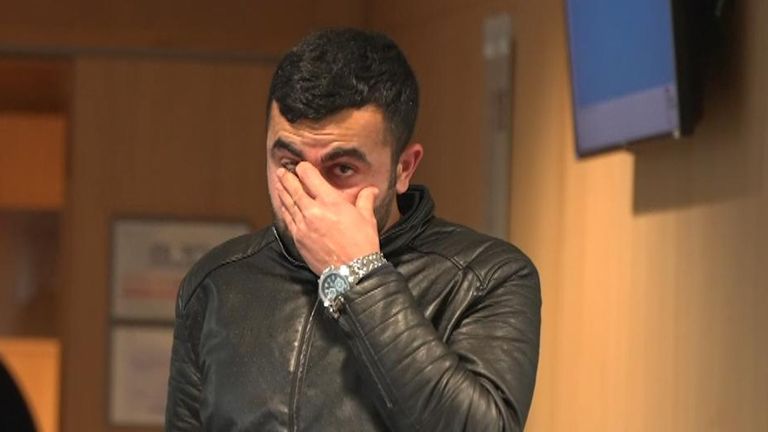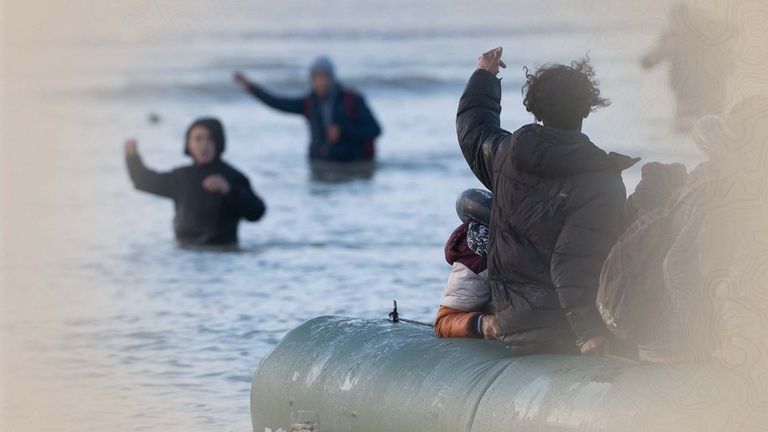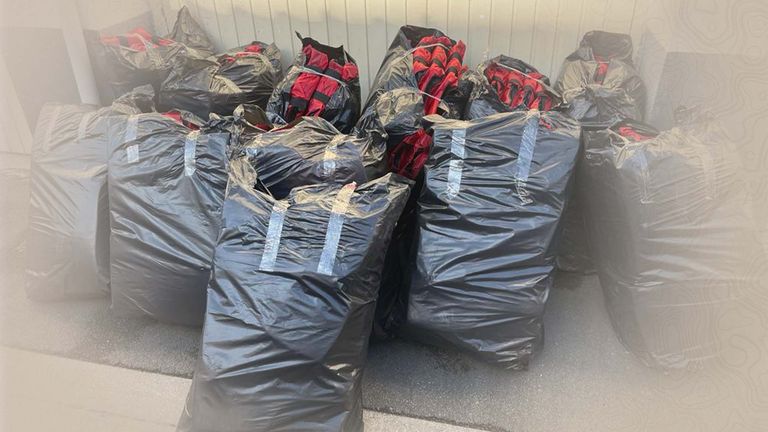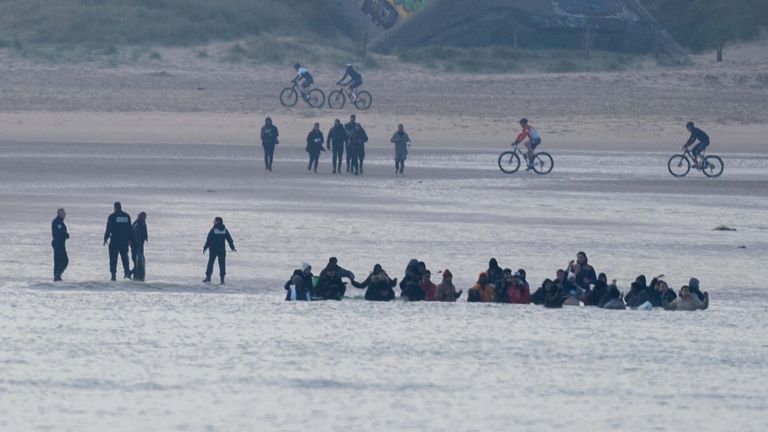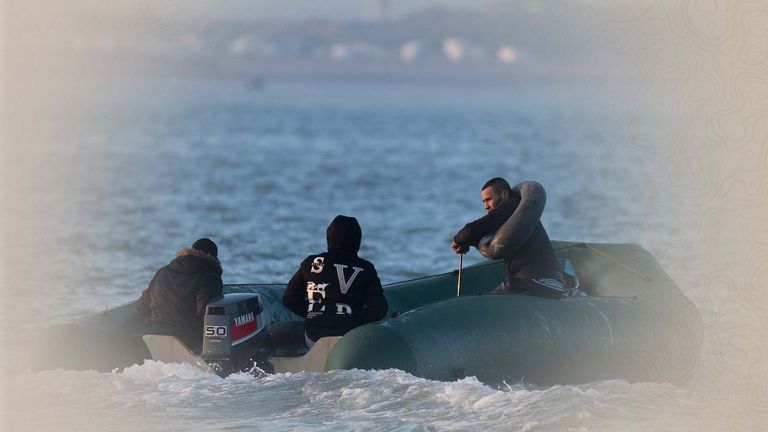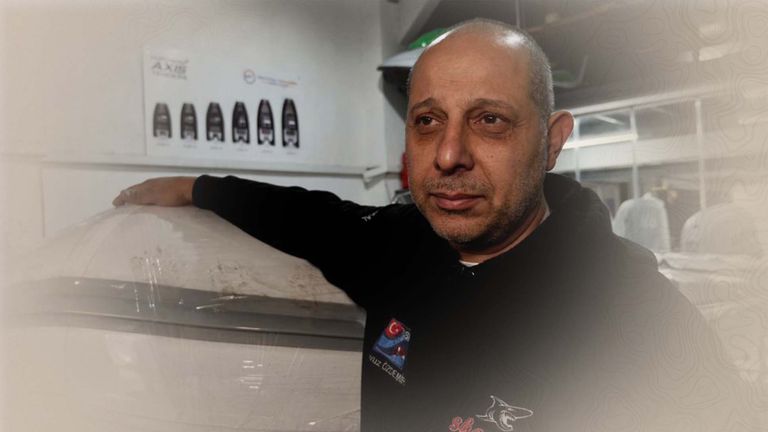People smugglers: How police exposed the dark world of small boat Channel crossings
The apprehension of a people smuggling gang in northern France was the result of a months-long operation by French and British police. From garage raids to tracking devices and slashed boats - Sky News reveals how these criminal networks operate.
Wednesday 8 February 2023 21:02, UK
This is a story of international crime, desperate people and politics. It starts with a man driving a dusty vehicle towards the north French coast on a summer night.
Hafid Belghoul, 41, is behind the wheel.
A father of six, he claims to work as a casual labourer on building sites. But the French police will later say they can find no evidence of him ever being employed.
What we do know is Belghoul has secrets.
He already has a criminal record - convictions for theft and assault. As well as several driving convictions.
Despite being behind the wheel for two decades, he's never actually passed his test.
And now, he's risking prison again, because behind him on this journey is a van carrying a people smuggling gang.
There's also a boat, an engine and life jackets, ready to take dozens of people across the Channel to Britain.
The gang has a plan if they get stopped by police on the lookout for suspicious vehicles.
As the only Frenchman, Belghoul will do the talking and say he's a builder on his way to a job, with the second vehicle carrying his labourers and their equipment.
For a while it works. The vehicles get through, the boats get loaded with migrants and Belghoul gets paid.
But what the gang don't know is that they're being watched.
Several months later, in late October 2022, there's a knock on the door of the house that Belghoul shares with his parents and three of his children. The police have come for him.
"We thought it was about his driving," his father told us. "He's not a bad person - he was manipulated by others. But if he's made mistakes, then he has to pay for them."
Four months later, his daughter sits in front of me in court.
She sobs quietly as he's sentenced to two years in prison. Belghoul smiles at her as he goes down to the cells, promising to phone as soon as he can. Then he disappears.
Belghoul was one of six people convicted on Tuesday, with sentences ranging up to five years.
In court, he was described as a man with a history of violence who had researched buying firearms online.
The other five people have been told that, when their prison sentences are over, they'll be deported and banned from ever returning to French territory.
In Belghoul's case, he's been banned from going to the regions around Calais, Dunkirk and Boulogne.
"If you want to see the sea again, you'll have to go elsewhere," the judge told him.
Shortly before the gang's arrests, the police raided a locked garage in the city of Douai.
They stormed through a courtyard between a bridalwear shop and a travel agency, and prised open an unassuming garage door.
There, a hundred miles from Calais, was a stash of small boats, outboard motors and life jackets.
The garage had been under surveillance since July. British police shared a tip off with their French counterparts about a shipment of nautical equipment that was expected to arrive in a small village near Douai.
French police acted on the intelligence, and on the morning of 29 July 2022, a Turkish registered van was spotted arriving, loaded with boxes.
Over the following months, listening devices and trackers were placed in different vehicles used by the gang.
At least four more shipments arrived, believed to have included around 32 dinghies that were destined to carry migrants across the Channel from two beaches - Oye-Plage, near Calais, and Camiers, which is further south, near to the well-heeled resort of Le Touquet.
At the end of the garage raid, the police's haul included: four boats, four engines, 120 life jackets, eight pumps, a fuel container and links to six suspects with some big questions to answer. Including Hafid Belghoul.
People smuggling is a lucrative business - a rough estimate suggests that, with an average price of around €1,500 per crossing, the gang could have made over €1.5m (£1.3m) from these journeys, even if not all the dinghies reached Britain.
Three of the men arrested were Iraqi Kurds. The others were Afghan, Sudanese and there was Belghoul, the single Frenchman.
The leader of the group was one of the Kurds, 32-year-old Alan Mohammad Ali.
The keys to the lock-up were in his pocket when he was arrested. And there were videos of migrants on boats on his phone.
Police believe he arrived in France in 2018, spending some time in a migrant camp near Dunkirk.
In the trial, it emerged that Ali paid the other members for their participation, and coordinated the deliveries of supplies to migrants waiting on the beaches.
He denied being the leader of the group and mentioned an unnamed Serbian man who he alleged was higher up in the criminal gang. As Ali waited for the verdict in court, he issued a plea to the judge.
"I made a mistake," he said quietly, "please give me a second chance."
His trusted lieutenant was another Iraqi Kurd - Zana Reza, 44. He'd made several attempts to cross the Channel, and failed.
The third Kurdish man, Peshawa Hassan, just 18 years old, was a guide and driver.
Abdou Adame, the Sudanese member, was seen by police as a more peripheral figure.
He claimed that he thought that boxes of equipment were full of clothes, and said the €1,200 he was carrying when arrested was set aside to pay for a new phone.
Incongruously, he was training to be a nurse with the Red Cross when he was arrested. A career that is now over.
While Adame was being trained in how to help people, his fellow gang member Naweed Safi, a 25-year-old Afghan, was working part-time in a local takeaway.
In court, it emerged that Safi told police he'd joined the gang to pay off debts he had built-up since arriving in France in 2016.
Those debts were partly to the people smuggler who helped him get to Europe.
And then there was Belghoul, the only gang member who already had a criminal record in France - the decoy driver without a driving licence.
So the police knew who the criminals were. They'd worked out how the boats got to the beach, and were starting to understand how customers were recruited, and payments were made.
Safi, for instance, was acting as an intermediary, scouting for customers.
Police later found details on his phone of locations in Grande Synthe, near Dunkirk, where many migrants make camps.
There were messages to other Afghans on his phone, offering them a "cut-price rate" of €1,500, instead of €2,200, and saying he could put them in touch with a friend who could help them get to Britain.
"I know a guy who organises crossings," he wrote in one message. "I gave him 35 people yesterday and, depending on the weather, they'll go tonight."
But there was one element that jumped out at investigators - the boats in that Douai lock-up weren't bought from a French shop or manufacturer, or even from a neighbouring country.
They had come all the way from Turkey, 2,000 miles away.
The tentacles of cross-Channel migration spread further than Calais, Dunkirk or even Douai. The Turkish connection is something we have been following.
A few months ago, on the beaches of northern France, we discovered three large inflatable boats.
A cursory glance revealed two things - they had been used in an attempt to get across the Channel, and also that, for whatever reason, it hadn't worked out.
Each boat had been deliberately slashed along the sides - a telltale sign that they'd been seen by police officers.
There was no maker's name, no labels or insignia. But, printed on the rubber near the main valve, there was a small patent mark. That told us that the boat had come from Turkey.
We spoke to a boat manufacturer in Istanbul who regularly receives, and refuses, offers from suspected smugglers.
"We produce and repair these boats," the boat builder says. "We receive orders from time to time. These come in waves, sometimes we can have 10 to 15 people calling us in a week. Then there can be silence for up to a month, when no one calls."
The callers are all looking for the same type of boats.
The typical length is eight to nine metres and "they prefer dark colours because they might want to cross at night," he says. "They're not looking for quality... They just want it to float."
These boats are bought to do one journey - to get across the Channel and into British waters.
They could probably carry a dozen people reasonably safely. Twenty would feel like a stretch. But instead, they are routinely sent out with 45 or more people crammed on to them.
Lucky passengers will be given a life jacket that fits. Others will get a children's life jacket. And sometimes, boats head out into the dark, freezing water - with no life jackets onboard at all.
The gang that made its home in Douai is no more. For the British and the French authorities, this represents real progress.
"This has been one of many significant operational results over the last two to three years," said Oliver Higgins, the deputy director of the UK's National Crime Agency.
"Jointly with France, we've disrupted 59 organised gangs, and we're building on that collaboration."
Outside the courtroom, Frederic Fourtoy, the regional chief prosecutor, said that cooperation with the British had been "absolutely crucial", and that the French response to people smuggling could continue to be "merciless".
The truth is that the numbers of people trying to cross the Channel in small boats is likely to rise once again this year, and the smuggling gangs are watching and learning.
Fourtoy described the gangs' "exceptional ability" to adapt to police methods.
This was a victory, but it's set in the context of a much bigger battle. Up on the north French coast, the boats are still setting off.

